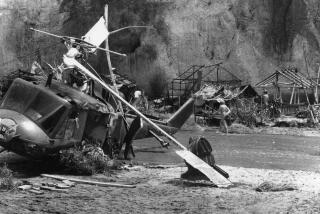Defense in ‘Twilight Zone’ Trial Rests Case : Prosecution Rebuttal Testimony Delayed by Argument Over Witness
- Share via
After 22 days of testimony from 16 witnesses, the defense in the “Twilight Zone” involuntary manslaughter trial rested its case Tuesday.
However, prosecution rebuttal testimony was delayed until today after an acrimonious non-jury session in which defense lawyers accused Deputy Dist. Atty. Lea Purwin D’Agostino of misrepresenting the planned testimony of her first rebuttal witness, an aerodynamics expert from Bell Helicopters in Texas.
Although Los Angeles Superior Court Judge Roger W. Boren agreed to give the defense more time to prepare for the witness, Boren also angrily ordered defense attorney Harland Braun to “stop yelling and screaming” and to “sit down.”
‘A Lap Dog’
Earlier in the day, Braun, who represents associate producer George Folsey Jr., referred to the prosecution’s chief investigator, Sheriff’s Sgt. Thomas Budds, as “a lap dog” and accused Boren of acting like Pontius Pilate.
“Very good, Mr. Braun. I think you’re ridiculous,” Boren retorted.
Rebuttal testimony in the trial, which began last September, is expected to take about a week and will be followed by at least another week of closing arguments. Director John Landis, helicopter pilot Dorcey Wingo, Folsey and two film-making associates are charged with criminal negligence in the 1982 film set deaths of actor Vic Morrow and two child actors.
The defense case, which followed 71 days of prosecution testimony from 71 witnesses, was highlighted by the appearances of Landis and Wingo, who sought to explain their actions in the fatal filming of a mock Vietnam battle scene.
Dramatically taking the stand as the first defense witness, Landis, 36, emphatically stated that he still believes the fatal scene was not inherently dangerous.
Testimony Contradicted
But the noted director, during four days of testimony, also conceded that he would “absolutely not” try it again. He also contradicted the testimony of more than a dozen prosecution witnesses, ranging from camera operators to fire safety officers to the parents of the dead children, Myca Dinh Lee, 7, and Renee Chen, 6.
Later Wingo, against the advice of attorneys for the other defendants, took the stand and told jurors that he, too, never worried that the ultimately fatal filming sequence would prove unsafe.
By taking the stand, however, the one-time military pilot was forced to answer prosecution queries about various statements he had given investigators that contradicted his trial testimony. In explanation, Wingo said he had suffered memory gaps following the “Twilight Zone” accident and was thus unable previously to recall such key details as a series of preflight production meetings with film crew members.
Wingo also made the startling statement that it “extremely distresses me to the max” that Morrow did not attempt to get out of the way of the helicopter during the five-second period between the time the aircraft spun out of control and when it decapitated him.
“Where did you expect Mr. Morrow to run?” D’Agostino retorted, emphasizing that the actor was carrying the two youngsters in his arms while standing almost knee deep in water at the time,
Wingo, in interviews outside court later, explained that he had not been trying to cast any blame on Morrow. But inside court, Wingo’s attorney, Eugene L. Trope, never asked him him clarify his statement for the jurors.
Trope also called two expert helicopter pilots as well as a clinical professor of psychiatry at UCLA, who backed Wingo’s post-trauma stress claim.
The other three defendants did not testify, their lawyers declared, because they believe D’Agostino did not prove them guilty of reckless conduct. Indeed, attorneys for unit production manager Dan Allingham and special-effects coordinator Paul Stewart did not call any witnesses.
Before resting their case, defense lawyers also sought to attack the credibility of D’Agostino, calling the former prosecutor in the case, Deputy Dist. Atty. Gary P. Kesselman, to testify that D’Agostino allegedly pressured him to support the testimony of one of her key witnesses.
Boren, in a decision that pleased the defense, ruled that D’Agostino and other prosecutors could not take the stand to rebut Kesselman.
More to Read
Sign up for Essential California
The most important California stories and recommendations in your inbox every morning.
You may occasionally receive promotional content from the Los Angeles Times.










